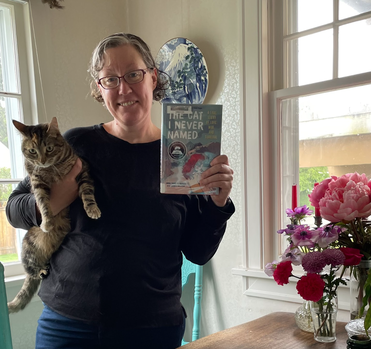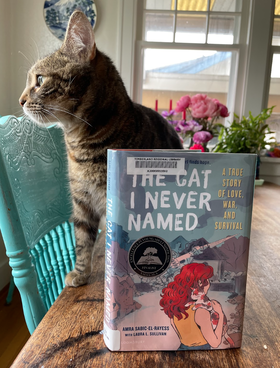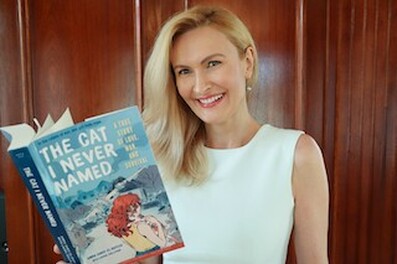Looking for something to read?
Check out our weekly suggestions!
Are your students looking for book recommendations?
Send them to browse through the picks for this or past years.
For the picks from 2021 click here
For the picks from 2020 click here.
For older picks click from 2019 click here.
For the even older picks click here.
Happy June! This month we are excited to introduce our newest guest contributor, Dr. Celeste Trimble. Dr. Trimble is an artist, a writer, and an Assistant Professor of Literacy at Saint Martin’s University in Washington State. She specializes in Indigenous literature for youth, queer literature for youth, and the intersections of book culture, youth culture, and the arts.
Check out our weekly suggestions!
Are your students looking for book recommendations?
Send them to browse through the picks for this or past years.
For the picks from 2021 click here
For the picks from 2020 click here.
For older picks click from 2019 click here.
For the even older picks click here.
Happy June! This month we are excited to introduce our newest guest contributor, Dr. Celeste Trimble. Dr. Trimble is an artist, a writer, and an Assistant Professor of Literacy at Saint Martin’s University in Washington State. She specializes in Indigenous literature for youth, queer literature for youth, and the intersections of book culture, youth culture, and the arts.
Weekend Pick for June 3, 2022

The Cat I Never Named: A True Story of Love, War, and Survival by Amra Sabic-El-Rayess with Laura L. Sullivan.
When the Russian invasion of Ukraine began, I was struck by the images of pets on social media. Ukranians evacuating with their pets, those unable to bring their pets, lost pets, and the reunification of pets with their people. Each story was heartbreaking in one way or another in part because I could easily relate to the love for an animal and how important animals can be in our lives.
I also kept thinking about The Cat I Never Named: A True Story of Love, War, and Survival, an incredible YA memoir by Amra Sabic-E- Rayess with Laura L. Sullivan. I first heard about this book at the virtual Tucson Festival of Books in March 2021 as I listened to the author speak powerfully about justice and war. The memoir details Amra’s experiences as a Muslim teen in Bosnia in 1992 during the Bosnian genocide. Amidst war and hatred, Amra develops a very special relationship with a stray cat despite her family’s objections. Maci, the Bosnian word for cat, returns to Amra and her family even when she is taken far out into the country. When the cat saved her brother’s life, it is clear that Maci is no ordinary cat, but then Maci saves Amra’s life, too!
Through this text, readers will get a very clear understanding of what it feels like to be in the midst of a war based on ethnic hatred. Amra’s relationship with the cat makes her and her story relatable in a way that is deeply affecting. Additionally, this particular war is not one that is widely studied by teens in the United States, so the historical context is an important addition to fill gaps in history curricula. Plus, it is a very compelling read.
When the Russian invasion of Ukraine began, I was struck by the images of pets on social media. Ukranians evacuating with their pets, those unable to bring their pets, lost pets, and the reunification of pets with their people. Each story was heartbreaking in one way or another in part because I could easily relate to the love for an animal and how important animals can be in our lives.
I also kept thinking about The Cat I Never Named: A True Story of Love, War, and Survival, an incredible YA memoir by Amra Sabic-E- Rayess with Laura L. Sullivan. I first heard about this book at the virtual Tucson Festival of Books in March 2021 as I listened to the author speak powerfully about justice and war. The memoir details Amra’s experiences as a Muslim teen in Bosnia in 1992 during the Bosnian genocide. Amidst war and hatred, Amra develops a very special relationship with a stray cat despite her family’s objections. Maci, the Bosnian word for cat, returns to Amra and her family even when she is taken far out into the country. When the cat saved her brother’s life, it is clear that Maci is no ordinary cat, but then Maci saves Amra’s life, too!
Through this text, readers will get a very clear understanding of what it feels like to be in the midst of a war based on ethnic hatred. Amra’s relationship with the cat makes her and her story relatable in a way that is deeply affecting. Additionally, this particular war is not one that is widely studied by teens in the United States, so the historical context is an important addition to fill gaps in history curricula. Plus, it is a very compelling read.





 RSS Feed
RSS Feed